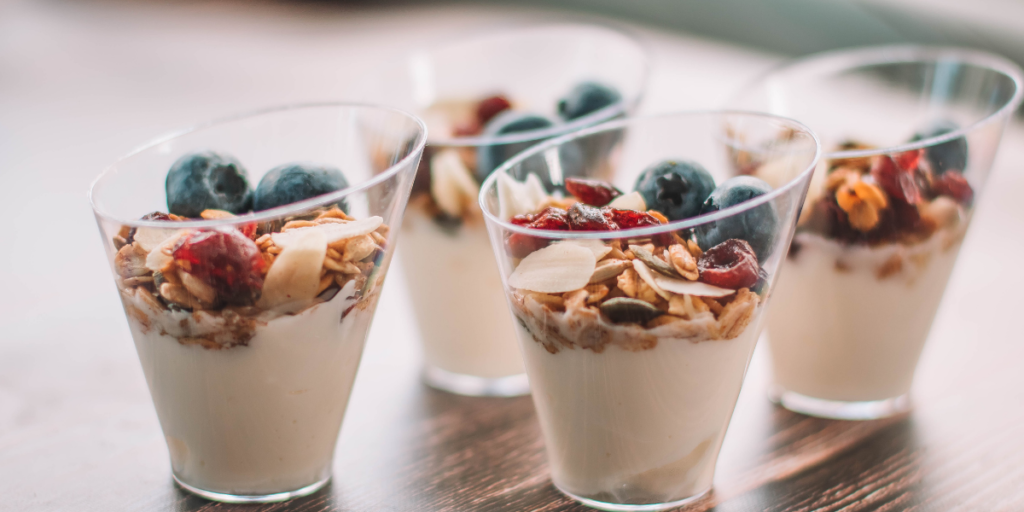There are around 40 trillion bacteria in your body – and most of them are found in your gut.
Your gut microbiome (the collective microorganisms that live in your gut) is incredibly important to your overall health. Many microbes are essential for good health but certain types of bacteria can be harmful to your health.
Many factors including your eating habits can affect your gut health, so here are 10 easy tips to help you keep your gut happy and healthy.
#1: Learn About Gut Health
Our gut health affects our general wellbeing more than we might think. It plays a huge part in determining how well our body digests food and how well we absorb nutrients – which is a big factor in determining how well our immune system functions and even our overall mental health.
Maintaining a healthy gut is way more complex than taking the occasional kombucha or yoghurt. Make some time to attend a talk in your community or include gut health videos created by healthcare professionals in your weekly TikTok or YouTube binges.
Knowledge is power! We will be linking studies and interesting research for tips below so you could also start by clicking on those links and reading.
#2: Eat Probiotic Foods in Your Diet
Probiotics are live bacteria and yeasts that are often called the “good” or “helpful” bacteria that play a role in maintaining a healthy community of bacteria in your gut.
They are commonly found in cultured/fermented food such as kefir, yoghurt, kimchi, pickles, sauerkraut, tempeh and miso to name a few common foods from many different cultures around the world.
If you generally dislike fermented foods or your family brings out the air freshener to combat your kimchi breath – you could also find probiotic supplements in some pharmacies. Do consult your physician if you are taking medication or are experiencing issues with your gut health before taking any supplements.

#3: Couple Your Probiotics with Prebiotics
You could think of prebiotics as food for your probiotics because prebiotics are the non-digestible carbohydrates your probiotics feed on. This process encourages your beneficial gut bacteria to multiply.
In fact, a research done in 2017 suggests that prebiotics may help probiotics to become more tolerant to certain environmental conditions including pH and temperature changes.
So while you chow down your probiotics, try to include prebiotic-rich foods like asparagus, bananas, garlic, onions and whole grain foods in your diet. Have fun with recipes that use these ingredients if you cook – why not have fun keeping healthy right?
#4 Consume Less Sugar & Artificial Sweeteners
Eating lots of sugar or artificial sweeteners may lead to an imbalance in your gut microbes known as gut dysbiosis. A study done in 2015 suggests that a diet high in sugar and fat negatively affects our gut microbiome which in turn, has some influence on our brain and behaviour.
There is also some evidence to suggest that artificial sweeteners can negatively affect blood sugar due to their effects on gut microbiome – which actually increases blood sugar despite not actually being sugar.
This doesn’t mean you can’t have cake on your birthday. Just be mindful of your sugar intake and your gut will thank you. Moderation is key.

#5 Chill, Don’t Stress
It’s no surprise that effectively managing stress is important for many aspects of health – including gut health.
A research paper published in 2018 found that some stressors negatively affect gut health such as:
- Disruption of the circadian rhythm
- Environmental stress (e.g. extreme heat, cold, noise)
- Psychological stress
- Sleep deprivation
It’s a good idea to establish healthy habits to help you manage your stress well.
#6 Avoid Taking Antibiotics Unnecessarily
Just a quick note on antibiotics before we talk about how it can affect your gut health – antibiotic overuse is a significant public health concern because it can lead to antibiotic resistance. Antibiotics are only sometimes necessary to combat bacterial infections so please don’t be surprised if antibiotics may not be a part of your prescription.
Back to the topic – there is research to suggest that antibiotics can still affect your gut microbiota even 6 months after use. This study in particular found that the gut still lacks several species of beneficial bacteria even after 6 months of taking antibiotics.
As a rule of thumb, it’s a good idea to discuss antibiotics and alternative options with your physician because it could be better for your gut health if you didn’t have to use antibiotics.

#7 Exercising Regularly Helps
There is some research to suggest that regular exercise may help to improve gut health which may in turn, help to control obesity.
It’s also a great way to regulate stress in the body (remember point #5?) and it’s one of the general things more people should do to keep healthy. A study in 2014 did find that athletes had a larger variety of gut microbiomes than non-athletes however, they also had a more varied diet which could have affected the results.
Generally speaking, exercising regularly while eating a varied diet should keep your gut happy.

#8 Get Enough Sleep
There are tons and tons of studies done on sleep and how much sleep the average adult would need. There’s no conclusive, one-size-fits-all sleep pattern and duration that works for everyone’s bodies and lifestyle.
Because this article is for general reading, here are simple rules of thumb you can try that tend to be a good starting point for most people to sleep better:
- Go to sleep and wake up at similar times on a daily basis
- Try to get at least 7 hours of sleep per night
- Keep your bedroom quiet and dark during bedtime
Try these out and see what works for you.
#9 Breastfeed For At Least 6 Months
This is a tip for mothers who want to give their children a good start with their gut health. For the first 2 years of your baby’s life, their gut microbiome is continuously developing and is rich in beneficial Bifidobacteria which can help digest sugars in breast milk.
The results of the same study also suggest that infants who are fed formula have an altered microbiome with fewer Bifidobacteria than infants who are breastfed.
So if you’d like to help your baby’s gut health to start well, try to breastfeed them for at least 6 months if you can. The best person to ask about this subject would be your gynaecologist because they would know your situation the best.
#10 Consider Switching to a Plant-Based Diet
There is evidence that animal-based foods promote the growth of different types of intestinal bacteria than plant-based diets do.
Adding on to the earlier points #2 & #3 about eating more probiotic and prebiotic foods which are commonly found in fruits, vegetables and fermented varieties of vegetables, they also contain fibre which is not found in animal-based foods.
There are some studies on strict vegetarian diets that suggest this diet improves risk factors associated with metabolic diseases by modulating gut microbiota.
Again, diets are very personal to you based on your lifestyle, health issues and medications you are taking so this may not be for you. Before committing to drastic diet changes, it’s always advisable to consult your physician for advice.
Bonus Tip: Avoid Smoking
Yes, this is another reason to avoid smoking.
There is a paper published in 2018 which found that over a 16-year period, smoking altered the intestinal flora by increasing potentially harmful microorganisms and decreasing the levels of beneficial ones.
This could lead to an increase in the risk of intestinal and systemic conditions, such as inflammatory bowel disease (IBD)
Not only that, but smoking might affect your ability to exercise too which is important for gut health.
Final Thoughts
Maintaining a healthy gut is more than just maintaining healthy digestion and bowel movement. It contributes to our overall health and immune function.
It’s important to remember that our gut is an ecosystem of microbiomes – live organisms that help maintain our health and the better you treat them, the better you’d feel. You don’t have to make drastic changes to take care of your gut – moderation is key.
Try to be conscious about the food choices you make, and try to incorporate more foods that promote good gut health into your daily diet.
For any good habits to be kept, you need to enjoy them. Find forms of exercise you enjoy with a community of people who share that joy. Develop a sleep ritual that calms you down and helps you wake up fresh. Experiment with food and learn to enjoy healthier choices.
But if you are facing issues with your gut health, always consult a physician to understand your condition and discuss with them changes you intend to make to your diet/lifestyle before you act on it to stay safe.
Stay healthy and happy, always!